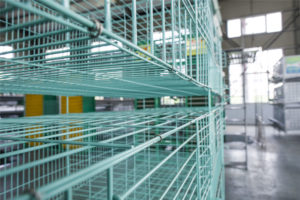Air humidity is a physical quantity indicating the degree of moisture in the air, called “air humidity”, abbreviated as “gas humidity”. It is usually expressed by relative humidity, which is the ratio of the actual water pressure in air to the saturated water pressure at the same temperature, expressed as a percentage. For chickens, the suitable relative humidity in the chicken poultry cage equipment is 50%-70%, less than 40% is low humidity, and higher than 80% is high humidity.
Raising chicken in automatic poultry farming equipment should be high in the front and low in the front, but in actual production, many chicken farms are just the opposite, before the low and then high. In the early stage, the humidity was low, and the flocks were prone to respiratory diseases. Through a large number of clinical observations, the occurrence of air sacs and bronchial obstruction has a very large relationship with the low humidity in the early stage of the house. Therefore, the relative humidity during brooding should be maintained at 65%-70%. Under normal conditions, the chicken’s respiratory tract is moist and covered with a layer of mucous epithelium with mucus. When most dust particles enter the respiratory tract, they are adsorbed by the cilia in the upper respiratory tract, and the chicken body excretes the dust through the cilia to prevent the microorganisms from entering the body. When the air is dry, the degree of moisturization of the respiratory mucosa is lowered, and the motor function of the ciliated epithelium is suppressed. In addition, due to the dryness, the dust in the house is greatly increased, and various microorganisms enter the alveoli and airbag through the respiratory tract together with the dust. Severe, because the cilia epithelium is detached, the mucous membrane is dry and cracked, and the pathogenic microorganisms can directly invade the blood, causing respiratory disease in the flock.

Relative humidity has a greater impact on the virus than temperature. A virus with a lipoprotein capsule is more stable under low humidity conditions and has a longer survival time. This is of great significance in the defense of viral infections during the dry winter season. In recent years, the incidence of viral epidemics in winter and spring has become higher and higher, and the degree of harm has become increasingly serious. Humidity affects the amount of ventilation, and as the humidity increases and decreases, the amount of ventilation changes. The cause of low humidity, improper control of the ventilation system, excessive ventilation, take away the water vapor inside the house, so that the relative humidity of the air is reduced.